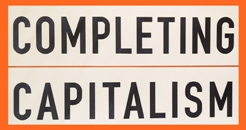 Completing capitalism
Completing capitalism
I'm sure we have all heard of the company Mars with their range of products; Mars Bars, M&Ms, Snickers, Milky Way, Skittles, Wrigleys, Uncle Bens rice, etc. Now over 100 years old, it is still a family owned business and it is one of the Top 25 World’s Best Multinational Workplaces. Many CEOs of large companies learned their trade at Mars and it has become known as, in effect, one of the best business schools in the world.
From early days, they have enshrined Five Principles as special values about the way the company should be run. These demanding values constantly guide the thinking and actions towards their associates, brands and business.
The Five Principles are as follows:
-
Quality
-
Responsibility
-
Mutuality
-
Efficiency
-
Freedom
Through following these Principles, the goal is to make a difference to people and the planet. They encompass themes of Health and Nutrition, Supply Chain, Environment, Operations, Products, and Working at Mars.
In 2007 before the financial crisis, Mars asked internally an unusual question.
'What is the right level of profit for its business activities?'
As King Solomon says,
"One person gives freely, yet gains even more; another withholds unduly, but comes to poverty." Proverbs 11v24
Just focusing on financial capitalism as many corporates do - the social responsibility of business is to use its resources and activities to increase profits for shareholders - has proved, to put it mildly, inadequate. Ok, there have been Corporate Social Responsibility (CSR) initiatives or philanthropic foundations on the periphery of businesses but these have not challenged the core mission of maximising profit for shareholders unconditionally.
Bruno Roche, the chief economist of Mars and leader of their internal think tank, Catalyst and Jay Jakub, director of external research for the think tank, started a research programme on the question
'What is the right level of profit for its business activities?' and have published their results to date in a book
'Completing Capitalism: Heal Business to Heal the World'.
The question on the right level of profit led to two further questions which focused research; 'Is there an optimum level of profit which ensures maximumisation of holistic value?' and 'What moral principles might justify how much value a firm can extract?'.
The management theory they are developing holds that business can simultaneously drive both profits and wider mutual benefits to people and the planet though understanding and managing multiple forms of capital, namely human, social, natural and shared financial capital.
They have developed thinking on new, simple, globally applicable metrics to measure actions related to these forms of capital. These are:
-
Human capital - individual well-being based on skills, experience, satisfaction, health.
-
Social capital - community well-being based on quality of life, prosperity, trust, cohesion, capacity.
-
Natural capital - natural resources used across entire value chain of a product, eg materials, water, air, soil.
-
Shared financial capital - how economic benefits of activities are shared among a value chain's participants.
The model leverages the principle of mutuality in business - the sharing of benefits - as a driver of value creation. It simultaneously promotes sustainable, profitable business and wider benefits in the form of human, social and environmental well-being. It mobilises and enhances visible and hidden riches (esp. non-financial) in many ecosystems which businesses operate. It leverages the power of capitalism away from just finance driven shareholders and traders to purpose-driven business leaders, entrepreneurs, communities, etc.
The authors make the point that the model in many ways revisits the concept of Jubilee - resetting the norms to continue to prosper, respecting a harmonious remuneration system, setting people and the planet free from exploitation, tackling inequality.
So what are Mars doing? This 2 minute video gives you the answer:
The research provided by the book should give all business leaders food for thought and the insights to help them widen their focus on financial capital to other forms of capital and by doing so reposition business as a restorative, healing power.
How can you use these insights in your business, with your employer?
Retweet about this article:
Geoff Knott, 03/10/2017